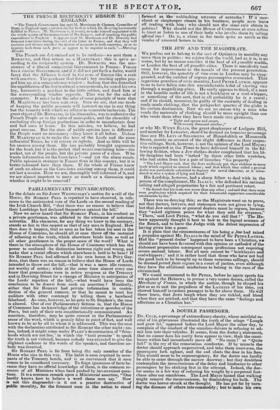PARLIAMENTARY PREVARICATION.
IN the debate on Sir JOHN WuorrEsnEv's motion for a call of the House, Sir ROBERT PEEL is reported to have observed, in refe- rence to the anticipated vote of the Lords on the second reading of the Irish Church Bill, " that there was no reason to believe that their Lordships had declared themselves against the bill." Now we never heard that Sir ROBERT PEEL, in his conduct as a private gentleman, was addicted to the utterance of notorious untruths. His character, for any thing we know to the contrary, stands as fair in this respect as that of any man in England. How then does it happen, that as soon as he has taken his seat in the House of Commons, he should all at once throw off the restraint of adhering to the truth, which elsewhere binds him as well as all other gentlemen in the proper sense of the word? What is there in the atmosphere of the House of Commons which has the power to confound ihe distinction between right and wrong, and make that a venial offence which elsewhere is held to be base? If Sir ROBERT PEEL had affirmed at his own house in Privy Gar- dens, that there was no reason to believe that the House of Lords intended to throw out the bill,—that it was a mere idle rumour, not worthy of notice; while at the same time almost every one knew that preparations were in active progress at the Treasury and in Downing Street for a change of Ministry in anticipation of the Lords' rejection of the bill,—what would have been the conclusion to be drawn from such an assertion ? Manifestly, either that Sir ROBERT had private information in contra- diction of the general rumour, or that he meant to treat his auditors with utter contempt by telling them a barefaced falsehood. As soon, however, as he gets to St. Stephen's, the case is altered. One of our Parliamentary fictions is, that the House of Commons has no knowledge of the intentions or speeches of the Peers, but only of their acts constitutionally communicated. An assertion, therefore, may be quite correct in the Parliamentary sense of the word, which is grossly false in point of fact, and well known to be so by all to whom it is addressed. This was the case with the declaration attributed to Sir ROBERT the other night ; un- less, indeed, it might come under PA.LEY'S denomination of "false- hoods which are not lies," in which the " tacit promise" to speak the truth is not violated, because nobody was expected to give the slightest credence to the words of the speaker, and therefore no- body was deceived.
Sir ROBERT PEEL is far from being the only member of the - House who sins in this way. The habit is soon acquired by occu- pants of the Treasury bench, and is so convenient that it soon comes to be considered necessary. To feign ignorance of facts be- cause they have no official knowledge of them, is the common re- source of all Ministers when hard pushed by inconvenient ques- tions. It is a common remark upon a Ministerial assertion, "One hardly knows how to believe a word these men say." Now is not this disgraeeful—is it not a practice destructive of public morality, for the foremost men in the nation to stand forward as the unblushing 'titterers of untruths ? If a mer- chant or shopkeeper cheats in his business, people soon leave off trading with him : why should not the same rule obtain in politics? Why should nut the House of Commons at once refuse to trust or listen to one of their body who insults them by telling eJdal lies ? He is, a cheat in his trade quite as much as the vender of unsound horses in his.




















 Previous page
Previous page